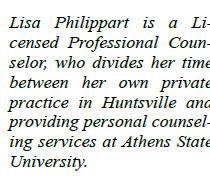The Stalker
 By: Lisa Philippart
By: Lisa Philippart
January is Stalking Awareness Month. I know, I know. I’m starting the year off on a difficult and unpleasant topic, and yet stalking is a problem of alarmingly increasing numbers. Roughly 1 in 6 women and 1 in 19 men in the United States have experienced stalking victimization at some point during their lifetime. In this article, I will address the stalker…stalking and mental illness and the types of stalking. My next article will focus on the victims…the effects on mental, physical, and social health and how to seek help. While many stalkers do not suffer from a mental illness, mental disorders are common among stalkers whose behaviors attract attention from the criminal justice system and the mental health community. In other words, we only have statistics on those who have been identified as stalkers in the legal and behavioral health populations, realizing that many stalkers are never reported. The research suggests that about half of the stalkers “in the system” experience some sort of mental disorder, with the most common conditions being schizophrenia and other psychotic disorders, personality disorders, depression, and substance abuse.


Stalking is a behavior, not a mental illness. While mental illness does play a role in stalking, its contributions vary greatly depending on the nature of the symptoms experienced, the context of the experience, and the role of other personal and environmental factors. Given the complex nature of mental illness, it is helpful to identify how mental disorders interact with stalking behaviors. In a small number of (reported) stalking cases, the behavior occurs as a direct result of psychotic symptoms, usually in the form of paranoid or delusional beliefs about the victim. In these cases, the stalking behavior is likely to resolve if the disorder underlying the behavior is successfully treated. Medication and psychotherapy may take time to come into effect but can help to manage the psychosis. For a larger number of stalkers, a mental illness other than schizophrenia is present and contributes to the onset and maintenance of the stalking behavior; however, the relationship is indirect or complicated by other factors. In these cases, treatment of the mental illness alone is usually unlikely to stop the predatory behaviors. Behavioral health interventions may provide alternative positive actions and coping strategies. The remainder of stalkers who do not suffer from a mental illness, might hold particular attitudes and beliefs that contribute to stalking patterns. These people, when confronted with the desire to change their interpersonal situations, use stalking as a strategy rather than a more socially appropriate behavior.
Let’s take a look at the types of stalking. While many stalking cases appear similar and involve the same kinds of behaviors, the reasons that people engage in stalking are complex and varied. One typology breaks stalking down into the type of prior relationship the victim had with the stalker. Stalkers are classified as ex-intimate (former sexual partner), an acquaintance (friends or family), or a stranger. This relationship-based categorization can be a useful starting point for thinking about the kinds of risks and management strategies that might be helpful in a stalking situation. Research shows that ex-intimates are far more likely to be violent than other types of stalkers. A slightly more complex typology divides stalkers into five types, placing greater emphasis on the context in which the stalking arose and the stalker’s initial motivation. These categories then include the nature of the prior relationship, and the role of mental illness in motivating the stalking behaviors. The focus is on the apparent function of the behavior for the stalker. The five classifications are: the rejected stalker, the resentful stalker, the intimacy seeking stalker, the incompetent suitor, and the predatory stalker.
Rejected stalker arises from the breakdown of a close relationship. The stalker is motivated by an attempt to reconcile or exact revenge.

Resentful stalker arises from feelings of being mistreated or humiliated. The stalker is motivated by a desire for revenge or regaining power and control.
Intimacy seeking stalker arises from feelings of loneliness and isolation. The stalker is motivated by the desire for an emotional connection or intimate relationship.
Incompetent suitor arises from insensitivity to social context and loneliness. The stalker is motivated by the desire to establish a short term sexual relationship.
Predatory stalker arises from the practice of deviant sexual interests and practices. The stalker is motivated by sexual gratification.
For more information, please contact the Stalking Resource Center at: http://www.victimsofcrime.org/our-programs/stalking-resource-center
By: Lisa Philippart
Licensed Professional Counselor